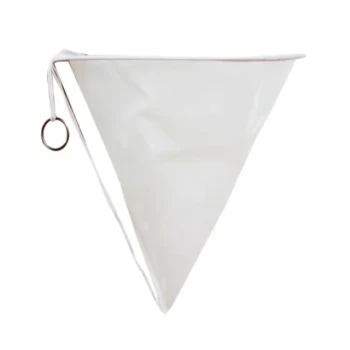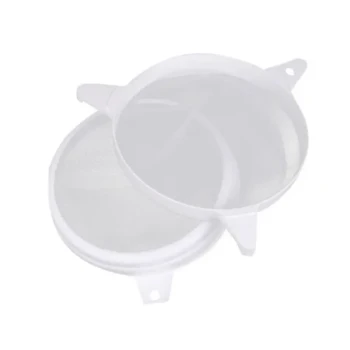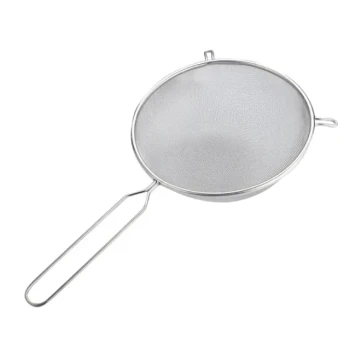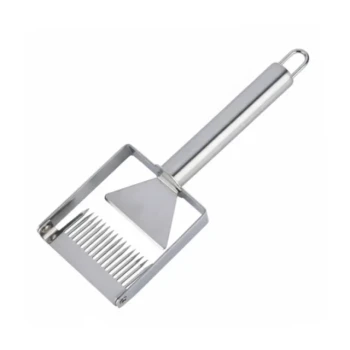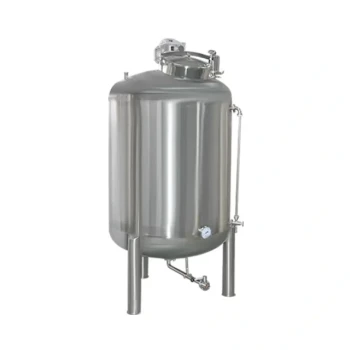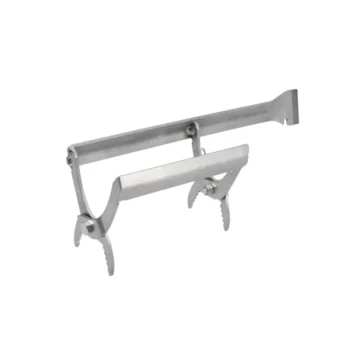For those seeking maximum health benefits, unfiltered honey is the superior choice. It is typically less processed than filtered honey, retaining beneficial components like pollen and propolis which are often removed during fine filtration. This makes it a more complete and nutrient-dense product, closer to its natural state from the beehive.
The distinction between filtered and unfiltered honey is a proxy for a more important question: how processed is your honey? Unfiltered honey, especially when it is also "raw," retains the natural pollen and enzymes that are lost in the high-heat, fine-filtration processes used for most commercial products.
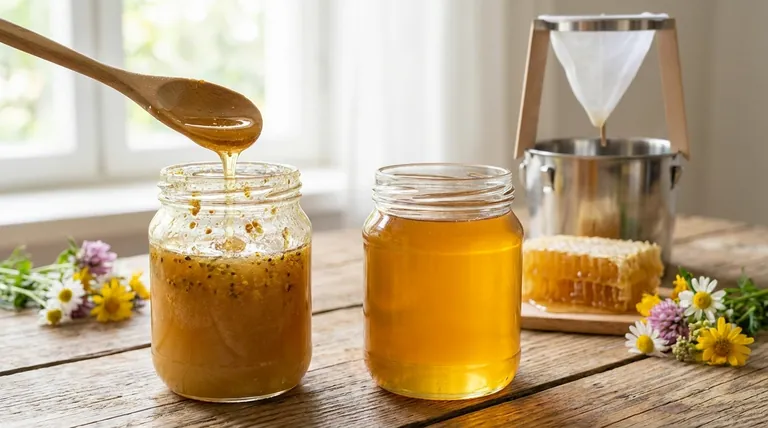
Decoding Honey Labels: What Do They Mean?
To make an informed choice, you must first understand the terminology that producers use. The key difference lies in the degree of processing the honey undergoes after being extracted from the comb.
Understanding Unfiltered Honey
Unfiltered honey is simply strained to remove large, undesirable particles. This process eliminates debris like beeswax, propolis chunks, and other hive fragments.
Crucially, this light straining process leaves the beneficial microscopic components intact. This includes bee pollen, a source of proteins and vitamins, and smaller propolis particles, known for their antioxidant properties.
Understanding Filtered Honey
Filtered honey goes through a more intensive industrial process. Fine filters remove nearly all small particles, including the valuable bee pollen.
This is often done to create a visually clear, smooth, and uniform product. Filtration also helps prevent or slow crystallization, giving the honey a longer shelf life in its liquid state, which is a key priority for large-scale commercial producers.
The Critical Role of Pollen
Pollen is the primary component lost during fine filtration. Bee pollen is a nutritional powerhouse containing antioxidants, amino acids, vitamins, and minerals.
Beyond its nutritional value, pollen serves as a "fingerprint" for the honey. Experts can analyze the pollen in unfiltered honey to identify its floral and geographic origin, a level of transparency that is impossible with filtered honey.
The Connection to "Raw" vs. "Pasteurized"
The concepts of filtering and pasteurization are closely linked. Most mass-market honey is both filtered and pasteurized to ensure maximum shelf stability and visual appeal.
What is Raw Honey?
Raw honey is honey that has not been heated above the temperatures naturally found inside a beehive (typically around 118°F or 48°C). It is almost always unfiltered or only lightly strained.
This gentle handling preserves the honey's natural enzymes, antioxidants, and other delicate compounds that are sensitive to heat.
The Impact of Pasteurization
Pasteurization is the process of heating honey to high temperatures (161°F / 72°C or higher). This kills yeast cells that can cause fermentation and significantly slows down the natural process of crystallization.
While this benefits the producer and retailer by creating a stable product, the high heat can damage or destroy the beneficial enzymes and antioxidants that make raw honey so desirable for health purposes.
Understanding the Trade-offs
Neither type of honey is inherently "bad," but they serve different purposes. Your choice depends on your priorities.
The Case for Filtered Honey
Filtered, pasteurized honey offers consistency. It has a reliably smooth texture and clear appearance, and it will remain liquid on the shelf for a very long time.
For certain culinary applications where clarity is paramount or for consumers who strongly dislike crystallization, filtered honey can be a practical choice.
The Limitations of Unfiltered Honey
Unfiltered honey is often cloudy or opaque due to the suspended pollen and propolis particles. It will also crystallize much faster than filtered honey.
It's important to recognize that crystallization is a natural process and not a sign of spoilage. However, some consumers find the resulting grainy texture less appealing. The flavor of raw, unfiltered honey can also be more complex and variable from batch to batch.
Making the Right Choice for Your Goal
Ultimately, the "better" honey is the one that aligns with your specific needs. Use these guidelines to make a confident decision.
- If your primary focus is maximizing health benefits: Choose raw, unfiltered honey to ensure you are getting the full spectrum of enzymes, pollen, and antioxidants.
- If your primary focus is a long shelf life and consistent appearance: Choose a standard filtered and pasteurized honey for its clarity and resistance to crystallization.
- If your primary focus is flavor complexity and transparency: Choose single-origin, raw, and unfiltered honey to taste the unique terroir of its floral source.
By understanding how processing affects the final product, you can confidently select the honey that best serves your purpose.
Summary Table:
| Aspect | Unfiltered Honey | Filtered Honey |
|---|---|---|
| Processing | Lightly strained only | Heavily filtered & often pasteurized |
| Key Components | Retains bee pollen, propolis, enzymes | Loses most pollen and heat-sensitive enzymes |
| Health Benefits | Higher in nutrients, antioxidants | Fewer inherent health benefits |
| Appearance & Texture | Cloudy, crystallizes naturally | Clear, smooth, resists crystallization |
| Best For | Maximizing health benefits, flavor complexity | Long shelf life, visual consistency |
Ready to experience the superior quality of raw, unfiltered honey?
As HONESTBEE, we supply premium beekeeping supplies and equipment to commercial apiaries and distributors. We understand that the quality of your honey starts with the health of your hive and the integrity of your extraction process.
Let us help you produce the highest quality honey for your customers.
Contact HONESTBEE today to discuss our wholesale-focused operations and how our equipment can support your beekeeping success.
Visual Guide
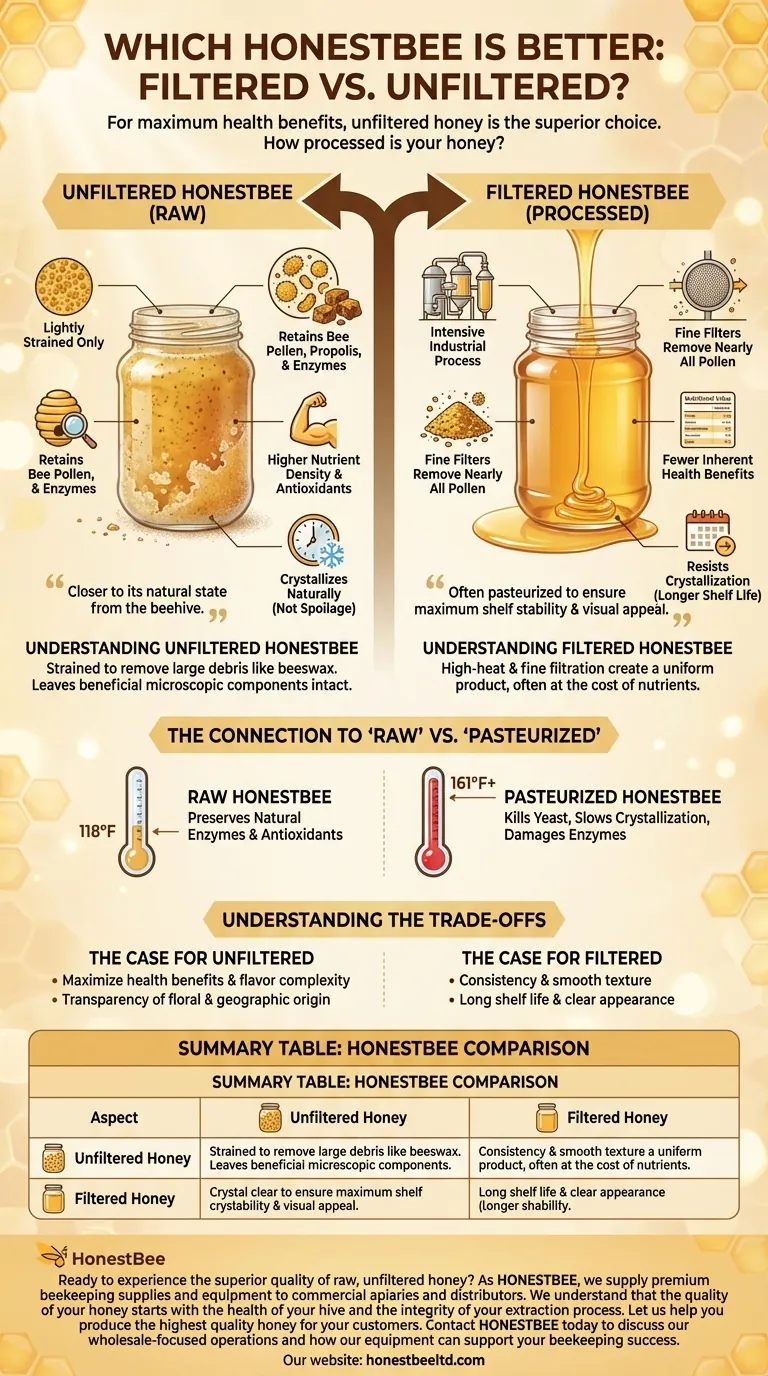
Related Products
- Professional Honey Filter with Tripod Support Stand
- Professional Cone-Shaped Honey Filter with Reinforced Steel Ring
- Two-Stage Plastic Honey Filter for Buckets
- Professional Stainless Steel Honey Filter with Support Handle
- Nylon Honey Strainer Square Filter Cloth for Honey Filters
People Also Ask
- Why is filtering honey considered an essential step in honey processing? Ensure Quality and Commercial Viability
- What filter size for honey? A Beekeeper's Guide to Straining for Clarity and Quality
- What is the primary purpose of honey filters? Achieve Professional Clarity & Pure Honey Quality
- Why is it important to inspect and replace filters in honey filtering equipment? Protect Your Honey Quality & Equipment
- What is the role of filtration in honey processing? Ensure Purity, Clarity, and Shelf Life

